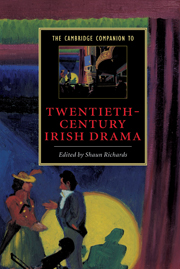Book contents
- Frontmatter
- 1 Plays of (ever) changing Ireland
- 2 Late nineteenth-century Irish theatre: before the Abbey – and beyond
- 3 The ideology of the Abbey Theatre
- 4 The theatre of William Butler Yeats
- 5 Lady Gregory’s Abbey Theatre drama: Ireland real and ideal
- 6 J. M. Synge, ‘national’ drama and the post-Protestant imagination
- 7 On the siting of doors and windows: aesthetics, ideology and Irish stage design
- 8 Oscar Wilde and the politics of style
- 9 George Bernard Shaw and Ireland
- 10 Sean O’Casey’s Dublin Trilogy: disillusionment to delusion
- 11 Ireland’s ‘exiled’ women playwrights: Teresa Deevy and Marina Carr
- 12 Samuel Beckett and the countertradition
- 13 Brian Friel’s sense of place
- 14 The Field Day Theatre Company
- 15 Tom Murphy and the children of loss
- 16 Reconstructing history in the Irish history play
- 17 The Abbey Theatre and the Irish state
- 18 Staging contemporary Ireland
- 19 The Revival revised
- Guide to further reading
- Index
- Series List
2 - Late nineteenth-century Irish theatre: before the Abbey – and beyond
Published online by Cambridge University Press: 28 May 2006
- Frontmatter
- 1 Plays of (ever) changing Ireland
- 2 Late nineteenth-century Irish theatre: before the Abbey – and beyond
- 3 The ideology of the Abbey Theatre
- 4 The theatre of William Butler Yeats
- 5 Lady Gregory’s Abbey Theatre drama: Ireland real and ideal
- 6 J. M. Synge, ‘national’ drama and the post-Protestant imagination
- 7 On the siting of doors and windows: aesthetics, ideology and Irish stage design
- 8 Oscar Wilde and the politics of style
- 9 George Bernard Shaw and Ireland
- 10 Sean O’Casey’s Dublin Trilogy: disillusionment to delusion
- 11 Ireland’s ‘exiled’ women playwrights: Teresa Deevy and Marina Carr
- 12 Samuel Beckett and the countertradition
- 13 Brian Friel’s sense of place
- 14 The Field Day Theatre Company
- 15 Tom Murphy and the children of loss
- 16 Reconstructing history in the Irish history play
- 17 The Abbey Theatre and the Irish state
- 18 Staging contemporary Ireland
- 19 The Revival revised
- Guide to further reading
- Index
- Series List
Summary
[A] thing that endures – that is the sole redress we have, against history and all its crimes.
(Stewart Parker, Heavenly Bodies)The longstanding notion that Irish melodrama before the founding of the Irish Literary Theatre is scarcely worthy of our attention is a well-worn myth. Like many clichés, this one about popular drama is minimally informed by fact, for there were no Shakespeares or Molières plying their crafts for popular audiences during the last half of the nineteenth century. In the past two decades or so, however, popular genres like Irish melodrama once dismissed as ephemeral or culturally negligible have been reclaimed. Equally important, as these once-neglected texts expand our purchase on turn-of-the-century Irish culture, they also enhance our understanding of greater, more canonical plays and playwrights. This essay, then, although focused on nineteenth-century melodrama, necessarily concerns both the popular and the more 'literary'.
Until recently, melodrama was regarded as too insignificant to inform serious discussion of modern Irish drama. Hugh Hunt, former Director of Plays at the Abbey Theatre, writes in the ‘Prologue’ to his 1979 history of the theatre that popular playwrights of the nineteenth century represented Ireland as largely ‘a mythical land of blarney and blather’; hence their names – he mentions J. W. Whitbread, John Baldwin Buckstone and Fred Cooke specifically – and the plays they wrote are ‘best forgotten’.
- Type
- Chapter
- Information
- The Cambridge Companion to Twentieth-Century Irish Drama , pp. 18 - 32Publisher: Cambridge University PressPrint publication year: 2004
- 2
- Cited by



